
Celebrating 50 Years of Humanae Vitae - Reason, Will, Prudence, and Generosity: A Reflection on Natural Family Planning
by Angelina Nguyen | 06/17/2018 | Weekly Reflection
"I Make All Things New": Changes in our Family Catechesis Program
by Fr. Chris Axline | 06/03/2018 | Weekly ReflectionMy brothers and sisters in Christ,
"Then Jesus approached and said to them, 'All power in heaven and on earth has been given to me. Go, therefore, and make disciples of all nations,baptizing them in the name of the Father, and of the Son, and of the Holy Spirit, teaching them to observe all that I have commanded you. And behold, I am with you always, until the end of the age'" (Mt. 28:17-20).
Thank you for your prayers these first few months in my new role as Parochial Administrator of St. Mary Magdalene. It is a great blessing to be able to serve you in this capacity! I know that many of you are curious about Religious Education (RE) in light of Jayne's relocation to OH. We wish Jayne well and thank her for her years of dedicated service to our parish. At this time, I want to write to you today about St. Mary Magdalene's Religious Education program. Religious Education is actually a topic that I am very passionate and excited about. Growing up, my mother was always involved in RE either as a catechist, or more often than not, the coordinator/director of RE programs. Her influence and example of ongoing formation and discipleship continues to inspire me to this day. Needless to say, a lot of my mother's influence has rubbed off on me as I to share a love of educating people in our rich Catholic Faith and forming them to be disciples of Jesus Christ. It is a rewarding experience.
Continue
Prescription for Failure
by Dr. Clint Leonard | 05/20/2018 | Weekly ReflectionContraceptives are supposed to make life easier. The idea is if married couples could have sex without the possibility of becoming pregnant that their marriages would be better, easier, and last longer. Couples would be happier. Unfortunately, it does not work that way.
Since 1960, when the introduction of the oral contraceptive pill accompanied and fueled the sexual revolution, there has been an explosion in the divorce rate. There is more sex before marriage, more cohabitation, and less commitment and actual marriages than ever. People are less satisfied and less happy. Why? Is there a link to the widespread use of the Pill? How about the use of long-acting contraceptives like the IUD or sterilizations – getting your tubes tied or having a vasectomy? Each of these interventions attempts to separate the possibility of new life arising from the act of intercourse, which ultimately separates the spouses from each other and from God. These broken relationships result in misery for the persons involved.
Continue
Introduction to Humanae Vitae
by Lita Arroyo | 05/06/2018 | Weekly ReflectionImagine Thanksgiving dinner in the average American home. In addition to the food, drink, and festive décor, lively argument is often a common staple as well. In order to skirt the conflict that will likely be the result of the diversity of lifestyles present at the table, one might be tempted to make it known that certain topics are “off limits.” This typically pushes issues like faith and politics off the table.
Pope Paul VI was not the type of man that would advocate for this false sense of peace. True peace is not achieved by deciding not to talk about matters that are most central to our understanding of what it means to be a human person, or how one is to live as a disciple of Jesus Christ in the world.
Continue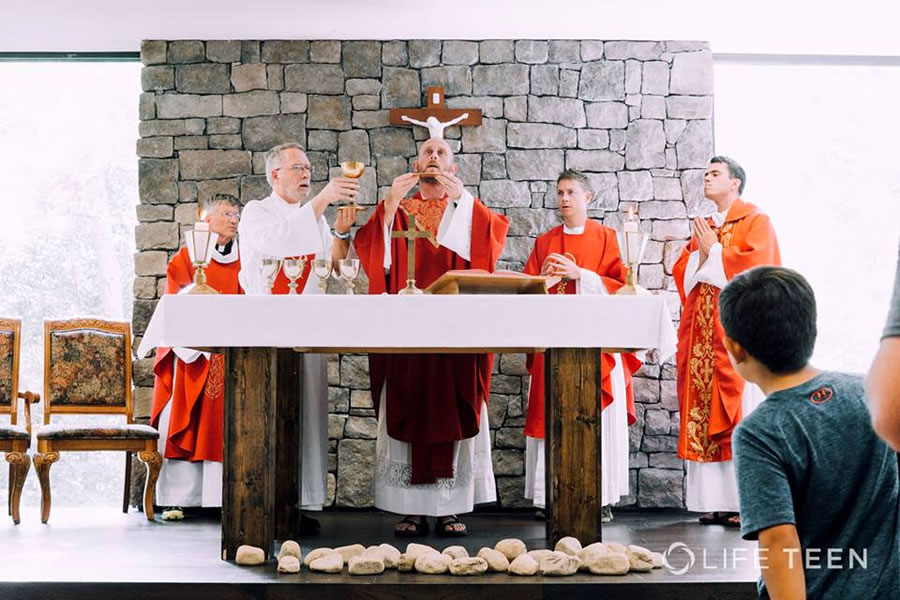
Behold, God’s Love for You
by Fr. Will Schmid | 04/01/2018 | Weekly ReflectionWhen we think of Old Testament sacrifices, we often think of bloody animal sacrifices. However, animals weren’t the only things sacrificed in the Temple. There were also “un-bloody sacrifices.” One of these sacrifices was the offering of bread.
According to the book of Leviticus, there was to be a perpetual offering of bread by the Jewish people. To fulfill this command, Jewish families throughout the year would bake bread and offer a portion of it in the Temple as a sacrifice to God. Some portions of those offerings were eaten by the priests, while other portions were preserved and placed in the tabernacle of the Temple. This offering was known as the “Bread of Presence.” The Bread of Presence was a sign of God’s continual presence among His people. As long as the Bread of Presence remained in the tabernacle, the Menorah was to remain burning brightly alongside it.
Continue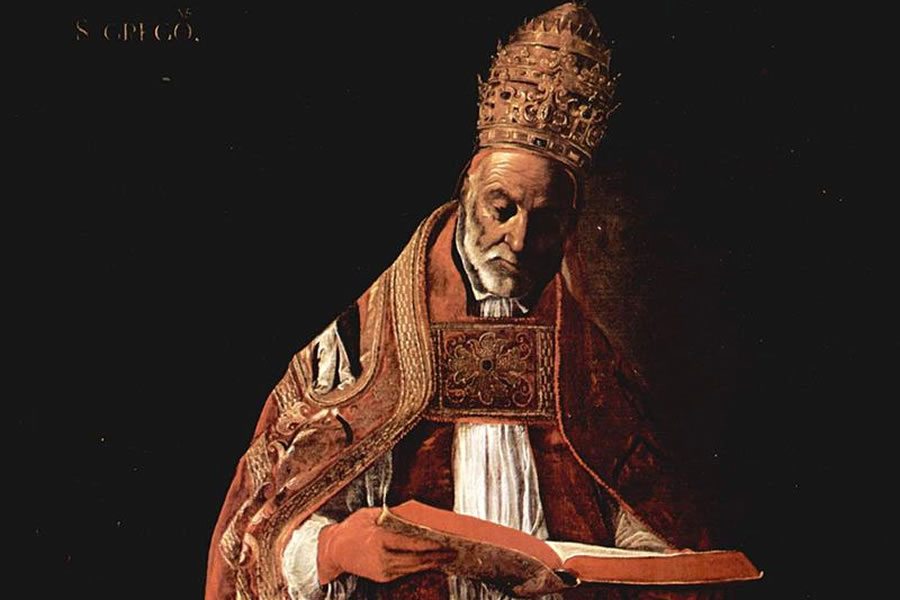
The Beauty of Gregorian Chant in the Liturgy
by Fr. Will Schmid | 01/28/2018 | Weekly ReflectionThis article is in continuation of a series giving a brief overview of the reform of the liturgy and sacred music...
One of the interesting details found in every Church document pertaining to Sacred Music is the emphasis on the significance and importance of Gregorian Chant. It is universally recognized as the music that belongs in a Roman Catholic Church. This is especially true with the Second Vatican Council’s document on the Liturgy (Sacrosanctum Concilium) and its implementation document for Sacred Music (Musicam Sacram). The following are some specific references to Gregorian Chant made by these documents:
Continue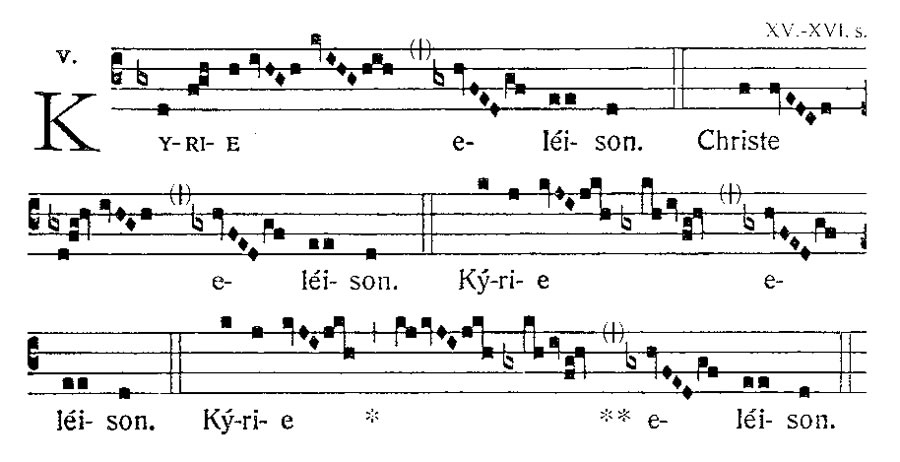
Vatican II and the Treasure of the Sung Mass
by Fr. Will Schmid | 12/10/2017 | Weekly ReflectionThe first document the Second Vatican Council produced was the Constitution on the Sacred Liturgy, known as Sacrosanctum Concilium, which was completed in 1963. Since the Liturgy is at the heart and center of the Catholic faith, the bishops wanted the world to know that liturgical reform would be at the heart and center of this historic Council.
Pope Benedict XVI, as a young theologian participating in the Council sessions noted, “The decision to begin with the liturgy schema was not merely a technically correct move. Its significance went far deeper. This decision was a profession of faith in what is truly central to the Church - the ever renewed marriage of the Church with her Lord, actualized in the eucharistic mystery where the Church, participating in the sacrifice of Jesus Christ, fulfills its innermost mission, the adoration of the triune God.”
Continue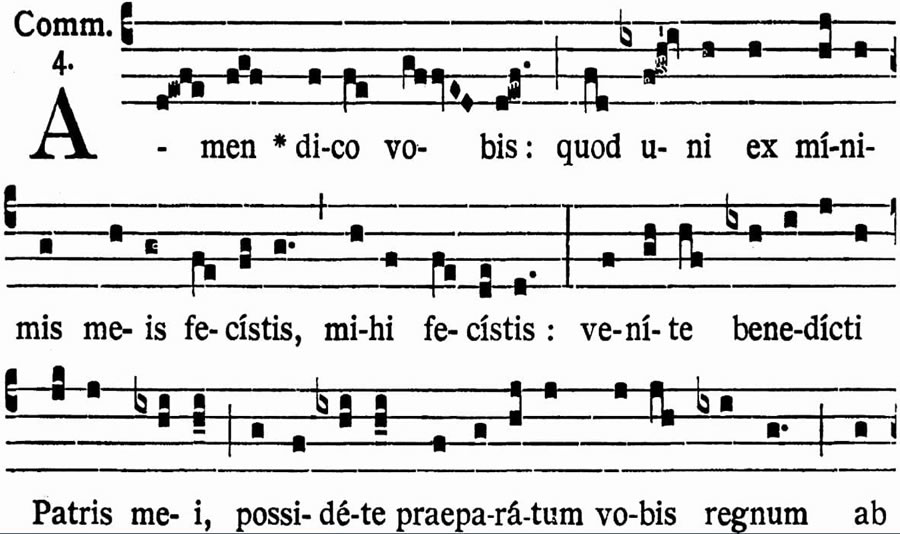
Sacred Music Reform Leading Up to the Second Vatican Council
by Fr. Will Schmid | 11/05/2017 | Weekly ReflectionIn his previous article from October 1st, Fr. Will discussed the contributions of Pope Pius X regarding Liturgical Reform in the Church. Here, he takes us through the next several decades of contributions in the area of Sacred Music.
The immediate decades following the release of Pope St. Pius X’s encyclical, Tra le solicitudini, in 1903 produced very little change in the American liturgical music scene. The phrase, “active participation,” inspired great optimism and led to many theological reflections and discussions, but the picture of worship in American Catholicism remained largely the same. The low Mass without congregational participation remained the norm and parishes struggled to help the people of God participate in singing the prescribed chants of the Solemn High Mass.
Continue
Gratitude and Hope
by Fr. Will Schmid | 10/08/2017 | Weekly ReflectionDedicated to all those who volunteer at our parish…
In 1972, nearly four and a half decades ago, a young popular German theologian and university professor by the name of Fr. Joseph Ratzinger (maybe you’ve heard of him) was invited to write an essay on the topic, “Why I am still in the Church.” His essay is one of the most beautiful I’ve ever read, and I think it provides some great food for thought as we seek to unpack these two themes of gratitude and hope.
Pope Benedict XVI’s essay is centered on the image of the moon as a way of understanding the identity and nature of the Church. The moon, as Pope Benedict explains, represents the world of men, the earthly world, the world that receives its identity and fruitfulness from somewhere else: from the sun. The light of the moon is borrowed light. It’s light is not its own, but rather the light of another. When we think of the moon, we think of the bright shining celestial body that lights up the sky and expels the darkness of the night. Because of the reflective light of the moon, we possess sight and thus, direction in the midst of dark times.
Continue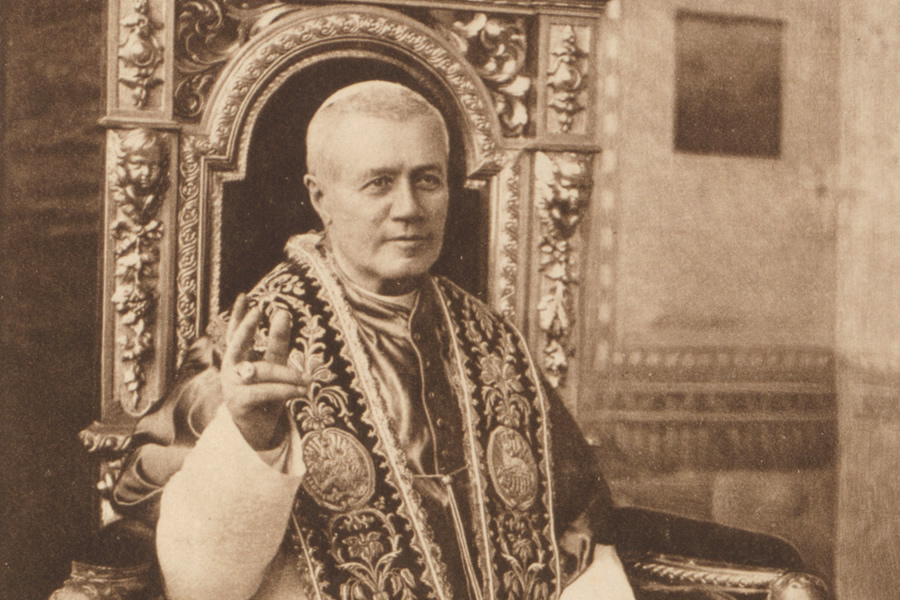
Pope St. Pius X and Liturgical Reform
by Fr. Will Schmid | 10/01/2017 | Weekly ReflectionWhen Cardinal Giuseppe Sarto inherited the chair of St. Peter in 1903 (assuming the name of Pope Pius X) the Catholic world was facing confusing times. The powerful influence of the Enlightenment, the rise of science, and a series of political, social, and intellectual upheavals in Europe resulted in a secularization of Europe. For the completely secularized European mind, the 19th century ushered in a new movement of “progress,” by which the world could throw aside the shackles of religion and provide human answers to human problems, freeing itself from the tyranny of religion, which only offered superstitions of a “supernatural order.”
Pope St. Pius X’s predecessor, Pope Leo XIII, worked tirelessly during a 25-year papacy (1878-1903) to reestablish the church’s viability within the modern world. The intellectual crown of his papacy was the famous social encyclical, Rerum novarum, in which the Church formally condemned the errors of communism and socialism, and built up a theology of worker’s rights and man’s right to private property. Yet, although Pope Leo XIII’s long papacy was an outstanding gift to the Church and the world, the secularization of Europe had done serious damage to the faith of many Catholics.
Continue
Workers in the Vineyard
by Fr. Will Schmid | 09/24/2017 | Weekly ReflectionToday’s Gospel (John 20:1-16), “The Workers in the Vineyard,” is one of the most difficult passages in all of Scripture to understand. For many of us, we fail to see the truth, goodness, and beauty that Jesus is trying to convey with this challenging parable. Most of the time, we fail to understand this Gospel because we approach it from the perspective of the kingdom of man, rather than the kingdom of God. From the perspective of the kingdom of man, Jesus presents an unjust landowner who rewards laborers who are lazy and work less, rather than providing greater compensation for those who start early and work all day.
Continue
Liturgical Question Box
by Fr. Will Schmid | 06/08/2017 | Weekly ReflectionFather Will answers some common questions about the Liturgy in the first of many articles in this new series.
What’s up with the funny looking hat you wear on special occasions?
It’s called a “biretta” and its origin dates back to the Middle Ages. It was originally used as an academic cap, but eventually made its way into liturgical use during the Renaissance. Since the 1960’s in the United Sates, it has fallen out of fashion and is rarely seen in Catholic liturgies in America. Yet, contrary to popular belief, its liturgical use was never abolished.
Continue